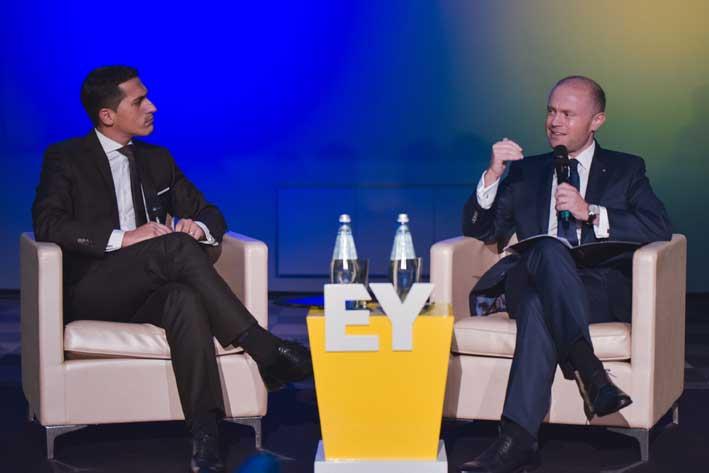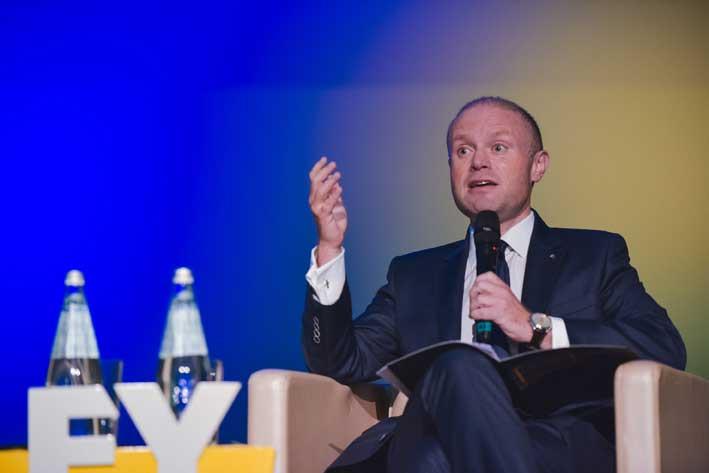Gender mainstreaming, upping our game when it comes to education, and remaining an open country to attract foreign talent were the three long and short term solutions Prime Minister Joseph Muscat put forward as essential to maintaining sustainable economic growth.
Speaking at the EY Malta Attractiveness Event, the Prime Minister was quried on the current economic position of the nation, and he noted that these are the “best and worst of times”.
“We really believe that these are problems of the modern times, but I wouldn’t barter these problems for high unemployment problems.”
Whilst admitting that there was indeed a talent shortage, he insisted that this is a gender issue, pointing towards the panorama of this society where the majority of the graduates from schools are women but their participation in the labour market is low.
“Now, with in-work benefits and other initiatives that we’ve taken, as a long term policy perspective, that participation number has risen.”
The second solution he presented was education, where he noted that they are doubling investment in the coming years.
The third is talent – the skills shortage present in the country – and Muscat said that “it is not so popular to say that we need foreign talent in the country, but we do”.
He explained that foreigners are coming over because the economy is growing, and most of this foreign talent is tapping into the skills shortages that we have, especially in extremely specialised areas.
Unlike EU leaders such as Frech President Emannuel Macron, Muscat insisted that being members of the EU, “freedom of movement is not something we should mess around with,” insisting that “anti-foreigner rhetoric is anti-business rhetoric”.
“There is no silver bullet, it has to be a two, three, four, or five-pronged approach.”

Competitiveness and Reputation
The legitimacy of the IIP scheme was also challenged, with the Prime Minister being asked whether it really has brought the best talent to the island, to which he pointed out that ours is the program that is under the most scrutiny, and that scrutiny has made us that best.
On competitiveness, Malta slipped two places on the Global Competitiveness Index of the World Economic Forum, and Muscat said that one of the reasons for this was the island’s infrastructure.
He insisted that our infrastructure is of the past century, and that road network upgrades are long overdue.
“Why are we spending €1 billion,” he asked, “because we got used to a very mediocre standard and we need to up our game” – going on to point out that certain markers such as getting a planning permit of 1000m2 in Valletta, which is a UNESCO site, make it harder.
On reputation, he explained that he likes to look at this issue from “outside the Malta bubble”, pointing towards a global focus on financial services.
“Most issues in other jurisdictions are pretty much the same – nowadays there is a focus on the ethical dimension of financial services which I think is something we have to live with and not meet with our hands up and take the punches.”

Technology and General Election
When asked what was next after having delved into Blockchain and Artifical Intelligence, the Prime Minister said that economic growth is not “silo-based”.
He insisted that in order to have a real long term perspective we must abandon the silo mentality and that there are two areas where growth would come from – then it falls to different sectors.
There are Regulatory sectors – which are industries that need regulation, this, he explained, is one of our core specialisations and we should specialize more.
The other is the Climate – where Muscat explained that climate-related changes in policy will be a primary contributor to growth.
“I would beg to differ with those who think of climate as a tree hugger subject – it is an economic subject.”
He noted that one of the big debates that are to be had in the EU and the EC will be on the Carbon Border tax which will tax items coming from outside the EU that don’t meet the required standards.
“Where does protectionism start and where does environmentalism stop?”
He did concede that this tax would hurt the most vulnerable, however, said that this will be a big debate that will start in the next few weeks and months.
“I see an opportunity for us to position ourselves in a way to be pro-business climate-sensitive jurisdiction.”
Interestingly, the final question that the Prime Minister was asked was on what his reaction would be after the next General Election, which he himself has said he would not be contesting.
Instead of saying that he would have stepped down by then, he said that he would let the people decide and that he would probably be on holiday if he lost.
Photos: Alenka Falzon